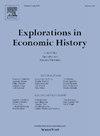The wheel of life? The effect of the abolition of the foundling wheel in nineteenth-century Italy
IF 1.7
1区 历史学
Q1 ECONOMICS
引用次数: 0
Abstract
This paper examines the effects of abolishing the foundling wheel (ruota) on reproductive decision-making in post-unitary Italy (1863–1882). The ruota was a turning wheel placed on a wall outside foundling homes across Catholic Europe, which offered a means for anonymous infant abandonment. As infant abandonment rates and foundling mortality soared in the nineteenth century, countries began dismantling these systems. Italy mirrored this trend, with provinces abolishing the ruota at different times. We investigate the specific impacts of the ruota abolition on infant abandonment, infant mortality, births, and gender discrimination. To do so, we use a novel longitudinal dataset of Italian provinces and a staggered Difference-in-Difference empirical design. Our findings show a 54.9% decrease in abandonment, a 10.4% decline in infant deaths, and a 4% drop in births after the abolishment of the ruota. This suggests a significant shift in reproductive behavior and family planning in response to policy change.
生命之轮?十九世纪意大利废除弃婴轮的影响
本文考察了废除弃婴轮(ruota)对统一后意大利(1863-1882)生殖决策的影响。ruota是一个放在育婴堂外墙上的转轮,它为匿名遗弃婴儿提供了一种手段。随着19世纪婴儿遗弃率和弃婴死亡率的飙升,各国开始废除这些制度。意大利也反映了这一趋势,各省在不同时期废除了ruota。我们研究了取消ruota对婴儿遗弃、婴儿死亡率、出生率和性别歧视的具体影响。为了做到这一点,我们使用了意大利各省的一个新的纵向数据集和一个交错的差中差经验设计。我们的调查结果显示,在废除法律后,遗弃率下降了54.9%,婴儿死亡率下降了10.4%,出生率下降了4%。这表明生育行为和计划生育因政策变化而发生了重大转变。
本文章由计算机程序翻译,如有差异,请以英文原文为准。
求助全文
约1分钟内获得全文
求助全文
来源期刊

Explorations in Economic History
Multiple-
CiteScore
2.50
自引率
8.70%
发文量
27
期刊介绍:
Explorations in Economic History provides broad coverage of the application of economic analysis to historical episodes. The journal has a tradition of innovative applications of theory and quantitative techniques, and it explores all aspects of economic change, all historical periods, all geographical locations, and all political and social systems. The journal includes papers by economists, economic historians, demographers, geographers, and sociologists. Explorations in Economic History is the only journal where you will find "Essays in Exploration." This unique department alerts economic historians to the potential in a new area of research, surveying the recent literature and then identifying the most promising issues to pursue.
 求助内容:
求助内容: 应助结果提醒方式:
应助结果提醒方式:


